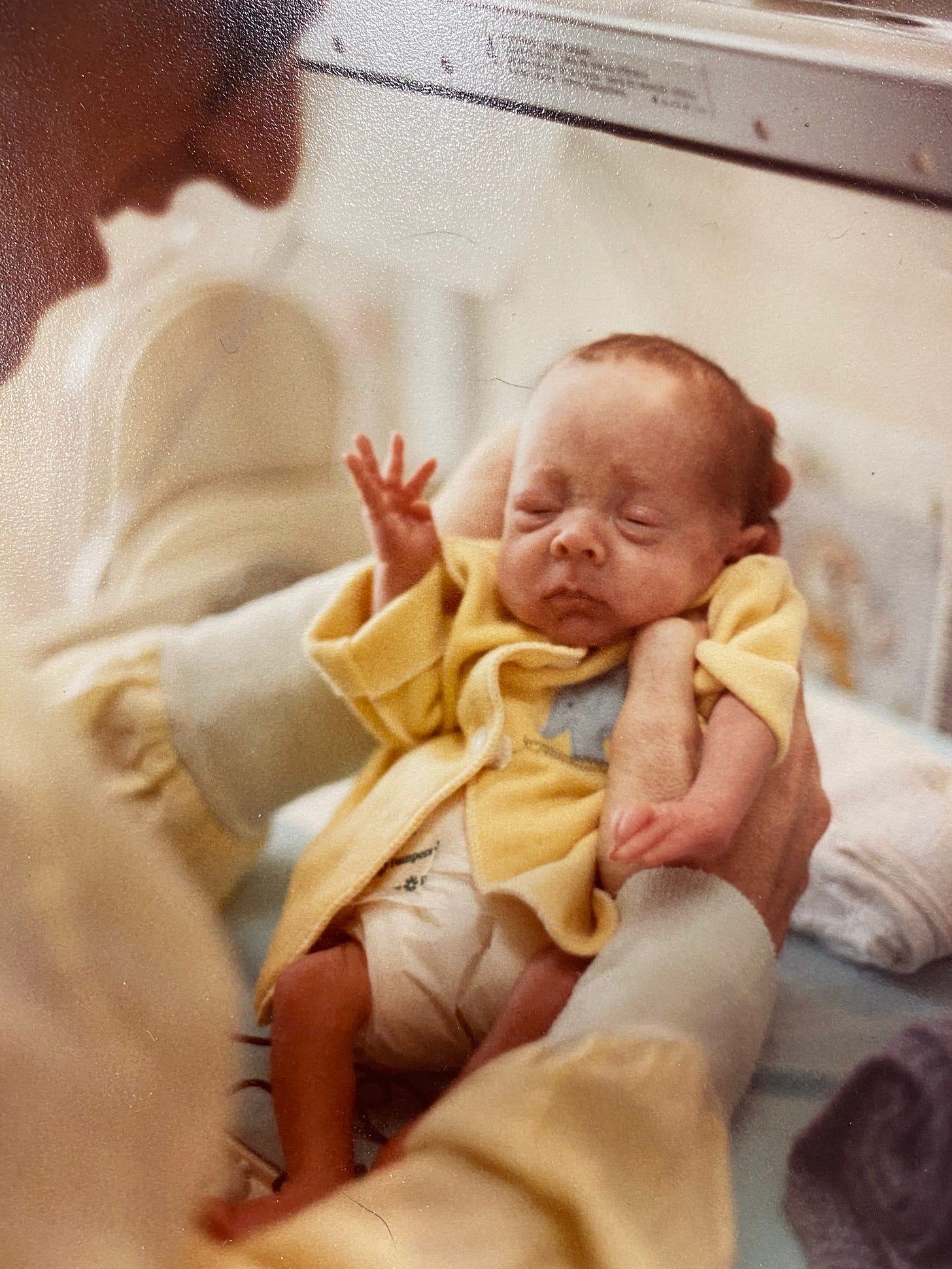One of the fascinating health trends in recent years has been the recognition that the gut microbiome, the collage of bacteria, yeasts and even viruses that live inside your gut, plays a massive role in determining your overall health. Previously, we focused on fermented foods like yogurt then kimchi, kefir and other cultural approaches evoked admiration and user confidence. The future looks so promising. I am certain that we will have many innovations that will positively affect the health and wellbeing of all ages.
Personally my passion for the topic is long standing. Back in the ‘80’s upon the premature birth of my eldest son, I sought to unravel the cause (and hopefully a solution to) the second leading cause of death for premature infants, necrotizing enterocolitis (NEC). Up to that point the dominant concept that was that NEC was caused by birth asphyxia with a lack of oxygen leading to intestinal necrosis.
Image: Holding my son, Nick, after 4 months in the NICU
There were massive problems with this concept. Firstly the average of onset for NEC was at 3 weeks after birth. Ischemia (think a heart attack) does not wait 3 weeks for the onset of the problem. Biochemically that makes no sense at all. Free radicals generated from disrupted utilization of oxygen occur in seconds (or less).
There were other clues that directed my attention to an infectious or bacterial component. Firstly, NEC occurred in clusters or outbreaks reflecting that it was transmissible. Additionally, a diagnostic feature of NEC is the presence of gas in the bowel wall. Gas generated in the intestine has a bacterial origin. Further, we noted that the pH of the small intestine where NEC was present (usually the end of the small intestine - the ileum) was very acidic, pH 3. How could it be so acidic? The answer was linked to the presence of gas from fermentation, because the other by product is short chain fatty acids eg butyric & propionic acid.
What we were able to show was that in very premature babies, the gut motility was not developed, combined with an immature digestive system resulted in food being made available to bacteria. In a NICU one could have outbreaks of opportunistic bacteria that avidly used undigested food for their own growth. The end result was that the local defenses in these babies were overrun, and the bacteria lowered the pH in the intestine to a point where permeability was compromised, gases accumulated and tissue necrosis was evident.
From our research we showed that the pathogenesis of NEC was not caused by birth asphyxia but was a tragic result of events where excessive dietary components were utilized by opportunistic bacteria to create conditions inside the gut that lowered the pH and caused necrosis Intraluminal origin of NEC . Interestingly, free radicals were involved in this process, so here was a connection to concepts related to ischemia, but the exception was that oxidative stress, free radical damage was the result of local inflammation in response to bacterial-nutrient conditions and not ischemia/reperfusion ( SOD limits Exptl NEC ; Free Radicals & NEC).
While these concepts were revolutionary at the time, in multiple ways, and very challenging to neonatologists, slowly we have evolved our treatment of NEC. However, sadly for these very premature babies it is still not complete. We now use probiotics, and in some cases prebiotics to modify the gut microbiome to make it more friendly ( Probiotics & NEC). The problem centers on that the gut from these premature infants is being asked to digest food before their time. Motility is still not well co-ordinated, digestive capacity is limited and neonatologists want to help the babies with the supply of nutrition. But if that feeding activity exceeds what the baby can handle, then the bacteria will take over and the result is NEC.
Certainly when these concepts were driven by myself and colleagues some 35 years ago we knew a lot less about the gut microbiome but it HAUNTS me to this day that the community still misunderstands NEC and premature babies are subjected to a truly horrible disease. My hope is that science will move faster, and our reticence to acquire knowledge and implement changes will accelerate.




